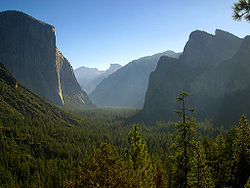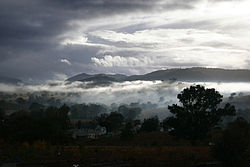- Morning
-
Not to be confused with Mourning."Early morning" redirects here. For the play, see Early Morning. For other uses, see Morning (disambiguation).
 Yosemite Valley in the morning
Yosemite Valley in the morning
The word morning originally referred to the sunrise. Morning precedes midday, afternoon, and night in the sequence of a day.
Morning is the part of the day usually reckoned from dawn to noon. The name (which comes from the Middle English word morwening) was formed from the analogy of evening using the word "morn" (in Middle English morwen), and originally meant the coming of the sunrise as evening meant the beginning of the close of the day. The Middle English morwen dropped over time and became morwe, then eventually morrow, which properly means "morning", but was soon used to refer to the following day (i.e., "tomorrow"), as in other Germanic languages—English is unique in restricting the word to the newer usage. The Spanish word "mañana" has two meanings in English: "morning," and "tomorrow."
Another definition of morning is the first half of the day - the period between midnight and 11:59am. The most obvious manifestation of this meaning is in English speaking countries where the greeting changes from "good night" to "good morning" when midnight passes.
Morning may also be used in a strictly personal sense, to refer to the period immediately following waking up, irrespective of the current time of day. In this sense, morning encompasses the (mostly menial) prerequisites for full productivity and life in public (i.e. cleaning, a morning meal—often breakfast, dressing, etc). The boundaries of such morning periods are by necessity idiosyncratic, but they are typically considered to have ended on reaching a state of full readiness for the day's productive activity. This modern permutation of morning is due largely to the worldwide spread of electricity, and the concomitant independence from natural light sources.[1]
A morning newspaper is one on sale in the mornings (as opposed to an evening newspaper, on sale from about noon onwards). In practice (though this may vary according to country) this means that a morning newspaper is available in early editions from before midnight on the night before its cover date, further editions being printed and distributed during the night. Previews of tomorrow's newspapers are often a feature of late night news programmes, such as Newsnight in the United Kingdom.
Morning meals include breakfast, though logically this need not be in the morning, and are varied across cultures. Brunch is a late morning meal.
The ability of a person to wake up effectively in the morning may be influenced by a gene called "Period 3". This gene comes in two forms, a "short" and a "long" variant. It seems to affect the person's preference for mornings or evenings. People who carry the long variant were over-represented as morning people, while the ones carrying the short variant were evening preference people.[1]
References
- ^ a b "Why some of us are early risers". BBC News. London. 2003-06-17. http://news.bbc.co.uk/2/hi/health/2996364.stm. Retrieved 2008-01-30.
External links
Parts of a day  Related articles: Blue hour · Golden hour · Terminator · Forenoon · Afternoon · Daytime · Daylight · Midnight sunCategories:
Related articles: Blue hour · Golden hour · Terminator · Forenoon · Afternoon · Daytime · Daylight · Midnight sunCategories:- Time in astronomy
Wikimedia Foundation. 2010.


